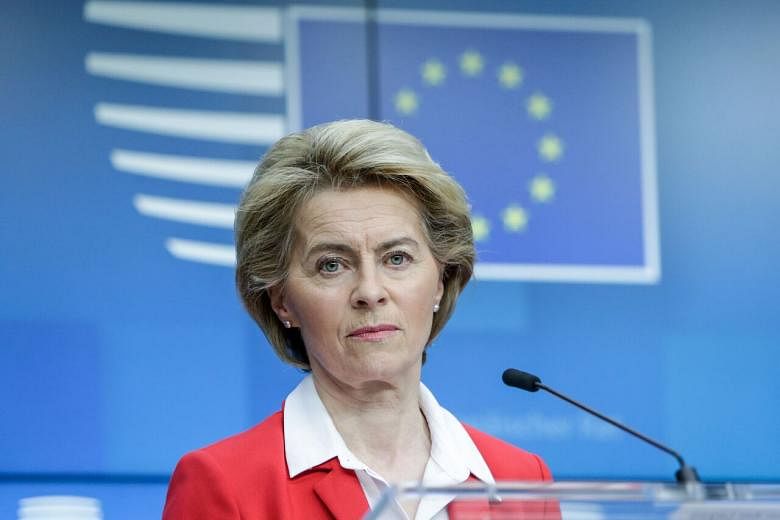Hospitals in Germany have offered to admit a handful of seriously ill Italian patients suffering from coronavirus-related complications.
"This is a very important sign that we are also able to help others," said Mr Michael Kretschmer, premier of the German federal state of Saxony, to where the Italian patients are being airlifted.
The move follows a similar initiative earlier in the week by three other German federal states to admit patients from France, which has also been hit hard by the pandemic.
France reported a cumulative 1,100 coronavirus deaths on Tuesday, up from 91 on March 14 - a more than tenfold increase over that period, according to Reuters.
Spain's virus death toll yesterday hit 3,434, higher than China's 3,281.
Italy, which has more than 69,000 infection cases, is expected to overtake China's case load of over 81,000 within days.
Although humanitarian moves by Germany are rightly hailed as examples of European solidarity, the reality remains that the European Union is still struggling to handle the coronavirus epidemic and suffers from a lack of consensus about what it can do.
Specific areas of health and safety - particularly those relating to trade in food products or transport - are very much a part of the EU's responsibilities.
The EU also has its own infectious disease agency, the European Centre for Disease Prevention and Control, established in 2005 as a result of the Sars (severe acute respiratory syndrome) outbreak in 2003.
Still, healthcare policy as such remains very much a responsibility of the 27 individual member states.
As a result, the European Commission (EC), the EU's executive body, has struggled to find a role in the current crisis.
As Italy became the epicentre of the pandemic in Europe, EC president Ursula von der Leyen issued a number of solidarity messages in which she claimed that all of Europe "are now Italians".
And, as the Covid-19 crisis gripped other EU countries, Dr von der Leyen continued to act as the true voice of the continent: Her online videos, delivered in many European languages and all calling on Europeans to pull together and share the burden, are judged to have hit the right note.
Still, the EC was sidelined as nation states adopted their own responses.
Long-forgotten border controls in Europe suddenly went up again as each nation scrambled to check the spread of the virus.
More seriously still, many European governments, including Germany's, imposed export controls on medicines and medical equipment, a move that tore up all the advantages of Europe's single market and hit badly affected countries such as Italy, precisely when the needs were greatest.
And if this was not enough, European Central Bank (ECB) president Christine Lagarde publicly claimed earlier this month that she did not see it as her business to help Italy borrow cheaply on world financial markets, notwithstanding the huge burden that the coronavirus epidemic is imposing on the Italian economy.
For a while, it looked as though the entire edifice of the EU was being torn apart by the crisis.
EU institutions have now regained the initiative. The EC has succeeded in persuading member states to stop hoarding medical supplies and instead share them across the continent.
And the ECB surprised financial markets last week with a €750 billion (S$1.2 trillion) financial package to buy government and company debt across the euro zone, including that of troubled Greece and Italy.
The so-called Pandemic Emergency Purchase Programme is hailed by Ms Lagarde as proof that "there are no limits" to Europe's commitment to defend the euro single currency.
She is also said to have asked euro zone finance ministers during a video conference on Tuesday to seriously consider a one-off joint debt issue of "coronabonds" to help fight the pandemic.
Critics of the EU's reaction in this crisis are forced to admit that the real problem was not so much the supposed dysfunctionality of the institution itself, but more the lack of preparedness for emergencies.
And although the border controls and other restrictions on movement in Europe are certainly a step back from EU principles, there is also broad agreement on the continent that such measures are necessary, and are unlikely to undermine the EU's future.
What is clear now is that the financial arrangements that govern the euro currency, and which mandate member states to control their budget deficits and restrict government borrowing, cannot continue.
But amending them will require German agreement, since any burden for a decision to allow EU members to run higher deficits and to guarantee this higher debt collectively will fall mostly on Germany's shoulders.
As always, therefore, the final say on such matters ultimately lies with German Chancellor Angela Merkel.
Yet she is hardly in a position to push through such a commitment to bail out most of Europe; her coalition government is weak and divided, and she is widely expected to retire by next year.












